Dijon mustard adds flavor and a sharp bite to many dishes, from homemade sauces to marinades and dressings.
But how can you replicate that signature Dijon tang in dishes if it’s not available?
What are the best substitutes for Dijon mustard? The best substitutes for Dijon mustard include yellow mustard, spicy brown mustard, honey mustard, horseradish sauce, or a combination of vinegar, garlic powder, and dry mustard. If you want something closer to the sharpness of Dijon, make a mixture of regular yellow or dijon mustard with white wine vinegar or apple cider vinegar.
Whether you’re out of store-bought Dijon or simply want to switch up your favorite condiment recipe with something new, these alternative options will give your dish a zingy kick!
Let’s take a look at the 10 best substitutes for Dijon Mustard and how to use them.
What is Dijon Mustard?
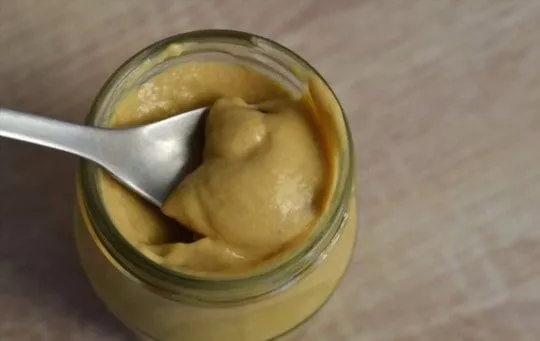
Dijon mustard is a type of mustard that originated in the city of Dijon, France.
It is made from brown or black mustard seeds that have been finely ground and mixed with vinegar, salt, and sometimes other spices or flavorings.
One of the defining characteristics of Dijon mustard is its smooth, creamy texture.
This is achieved by using a process called emulsification, which involves mixing the mustard seeds with a liquid (usually vinegar) until they form a smooth paste.
The resulting mustard is typically pale yellow in color and has a sharp, tangy flavor that is slightly less pungent than other types of mustard.
Dijon mustard is a versatile ingredient that can be used in a variety of recipes, from salad dressings to marinades to sauces.
It is particularly popular in French cuisine, where it is often used as a condiment for meats, sandwiches, and other dishes.
In recent years, there has been some controversy over what can legally be called “Dijon mustard.”
In order to be labeled as such, the mustard must be made in the Dijon region of France and must meet certain quality standards set by the French government.
However, many manufacturers around the world produce their own versions of Dijon mustard that may not necessarily adhere to these standards.
The 10 Best Substitutes For Dijon Mustard
Dijon mustard, a French condiment, is renowned for its mild, sweet-yet-spicy flavor.
Its subtle yet complex taste complements various dishes perfectly, making it an essential ingredient in many recipes.
If you’re looking for alternatives to Dijon mustard, here are ten outstanding choices:
1 – Yellow Mustard
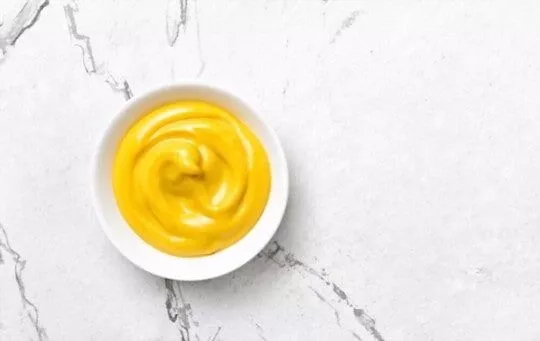
Yellow mustard is a versatile condiment with a mild flavor and tangy sweetness.
Its gentle spiciness adds depth to salads and sandwiches without overpowering other ingredients.
For optimal results in your favorite recipes, look for yellow mustards made from natural ingredients without added sugar or preservatives.
This simple swap creates a tasteful balance of flavors that can be tailored to your tastes by adjusting the amount used.
2 – Spicy Brown Mustard

Spicy brown mustard has a strong flavor profile that makes it unsuitable as a standalone condiment.
However, its distinctive sharpness can enhance dishes when used in moderation.
As an alternative to Dijon mustard, spicy brown is ideal if you’re looking to add more piquancy to your meals.
To prevent overpowering other ingredients in your recipe, use only small amounts of this spicy variety at a time and adjust accordingly until desired results are achieved.
3 – Honey Mustard
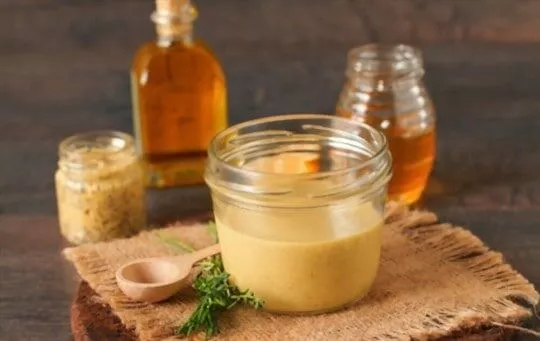
Honey mustard combines the tartness of mustard with the sweetness of honey—a delicious combination that enlivens any dish.
While not as piquant as other varieties, honey mustard provides an ideal balance of flavors that won’t overpower other ingredients in your meal.
Adding honey mustard in place of Dijon gives recipes greater depth while providing an added layer of sweetness that’s sure to please even the most discerning palate.
4 – Whole Grain Mustard
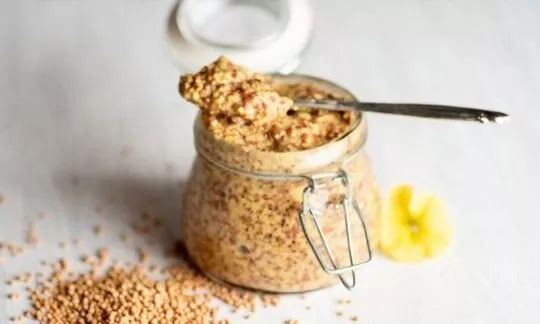
Whole grain mustard packs powerful flavor into every jarful thanks to the coarsely ground seeds it contains—making it perfect for those looking for robust taste without sacrificing texture or quality.
With rich aromas and spicy hues ranging from pale yellow to dark orange, whole grain mustard is an excellent choice when seeking bolder flavors than Dijon mustard offers while still maintaining some semblance of creaminess and texture that enhances dishes.
5 – Hot English Mustard

Hot English mustards offer intense heat but also boast rich flavor profiles that make them perfect complements for meat-based dishes like sausages and steaks or heartier vegetarian fare like roasted root vegetables or creamy soups.
Though some may find this variety too spicy for their liking when eaten straight from the jar, adding small quantities at a time can help create surprisingly delightful culinary experiences that elevate any dish beyond what traditional Dijon could provide alone.
6 – Horseradish
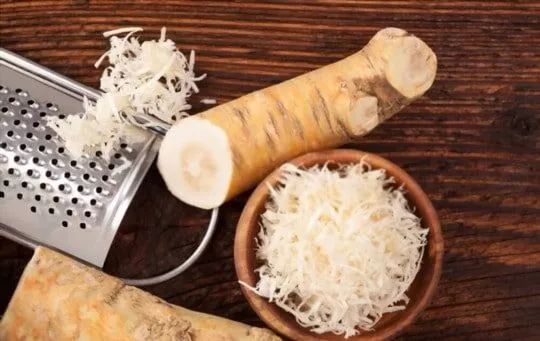
Horseradish offers a sharp kick to any dish, making it a popular condiment for centuries.
It’s often found in creamy sauces and served alongside grilled meats. Its pungent flavor is derived from its high allyl isothiocyanate content.
As an alternative to Dijon mustard, horseradish provides the same level of spiciness while offering a more distinctive taste.
For maximum flavor and heat, grate fresh horseradish root or use store-bought prepared horseradish.
However, since horseradish tends to be much hotter than Dijon mustard, it’s important to start with a small amount and adjust accordingly.
7 – Wasabi

Wasabi is a type of Japanese horseradish with a bold spicy-hot flavor that packs quite the punch.
This popular condiment is often paired with sushi or other cooked dishes for additional zing and color.
Similar to Dijon mustard, wasabi adds a flavorful kick without overpowering the other ingredients in your dish.
To substitute for Dijon mustard, mix together equal parts wasabi and water until you reach the desired consistency.
This simple step will transform wasabi into an ideal replacement for Dijon mustard in your recipes.
8 – Grainy Mustard
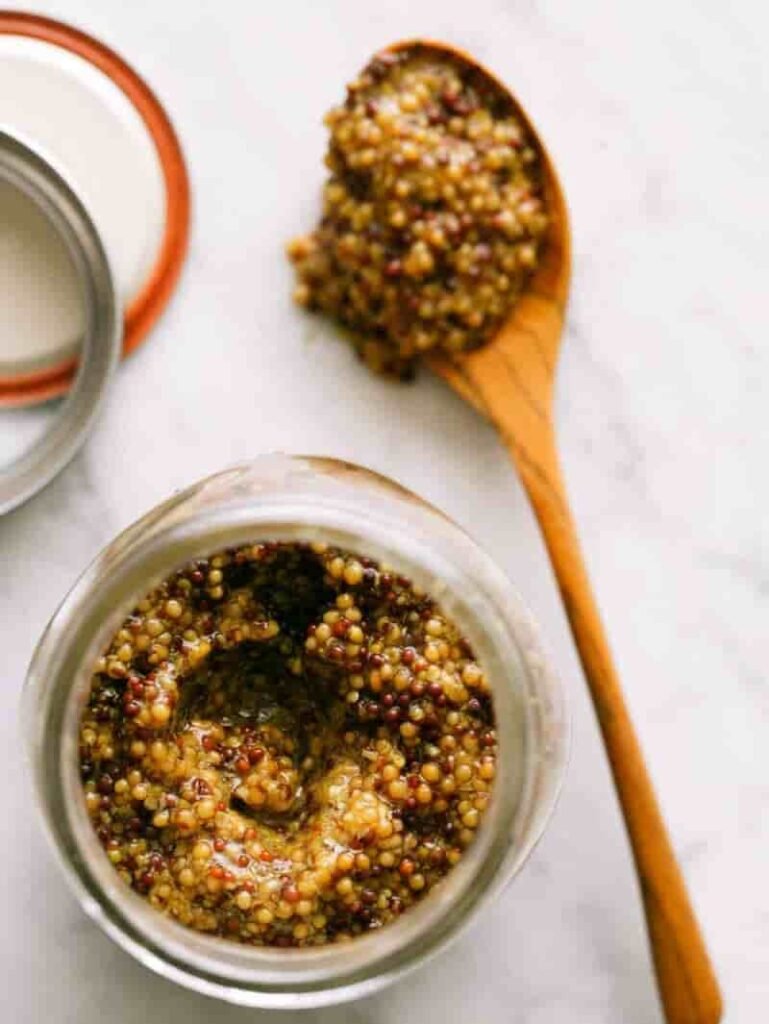
Grainy mustard is made from coarsely ground whole mustard seeds combined with vinegar and spices such as turmeric or paprika.
Due to its distinct texture, grainy mustards are often used as spreads on sandwiches or as dipping sauces for fried foods like onion rings or French fries.
For a less spicy alternative to Dijon mustard, consider incorporating grainy mustards into your cooking routine.
Just add it to your favorite sauces or marinades if you’re looking for extra moisture and complexity throughout your dish.
9 – Turmeric
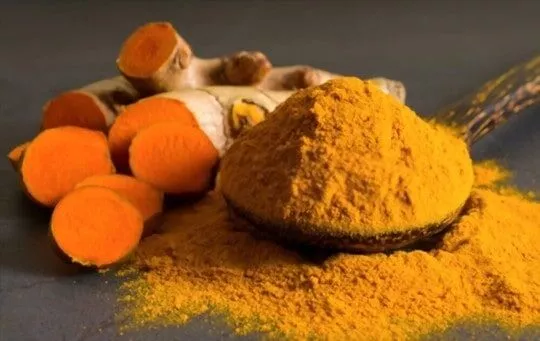
Turmeric powder has quickly become one of the most widely used seasoning agents due to its multiple health benefits, vibrant golden color, and earthy taste profile that pairs well with many foods, including fish, poultry, or vegetable dishes.
A teaspoon of turmeric can add zestiness similar to that of Dijon Mustard without adding any spice.
So, using this ingredient as a substitute may be preferred if those consuming it do not enjoy heat in their meals.
Turmeric also has anti-inflammatory properties, which make it great for those who suffer from autoimmune conditions.
10 – Curry Powder

Curry powder is composed of several aromatic herbs and spices such as turmeric, ginger, cumin, coriander, fenugreek, cardamom, etc.
Some blends may include pepper, which gives curry powders their characteristic mild heat, perfect for those who prefer their food mild instead of spicy.
If you would like to substitute curry powder in place of Dijon mustard, try mixing 1/2 teaspoon curry powder with 1 tablespoon olive oil along with some lime juice (optional).
Then use this paste as you would have used Dijon mustard in recipes such as dressings, marinades, etc.
Conclusion
In conclusion, Dijon mustard is a popular condiment that adds a tangy, sharp flavor to a variety of dishes.
However, if you don’t have Dijon mustard on hand or prefer a milder flavor, there are several substitutes you can use, including yellow mustard, spicy brown mustard, honey mustard, whole grain mustard, hot English mustard, horseradish, wasabi, grainy mustard, turmeric, and curry powder.
Each substitute has its own unique flavor profile, so it’s important to taste as you go and adjust the seasoning to your liking.
With these substitutes, you can still enjoy the flavor and versatility of Dijon mustard in your favorite recipes.
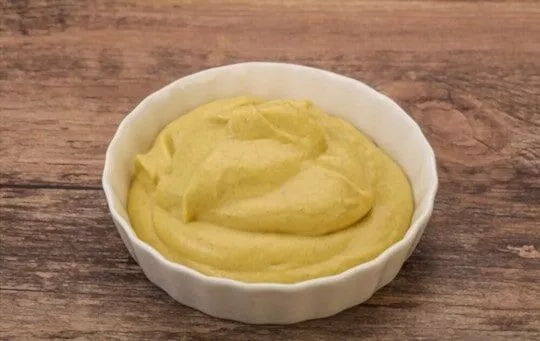
The 10 Best Substitutes For Dijon Mustard
Ingredients
- Yellow Mustard
- Spicy Brown Mustard
- Honey Mustard
- Whole Grain Mustard
- Hot English Mustard
- Horseradish
- Wasabi
- Grainy Mustard
- Turmeric
- Curry Powder
Instructions
- Pick your favorite substitute from the list above.
- Follow cooking directions for your selected substitute with the proper ratio of ingredients.
Jenny has always been passionate about cooking, and she uses her platform to share her joy of food with others. Her recipes are easy to follow, and she loves giving tips and tricks to help others create their own unique culinary creations.

